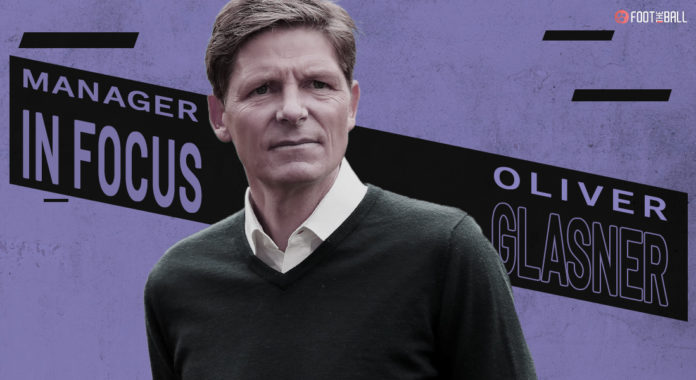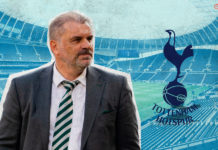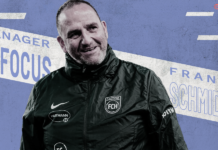Success has followed Oliver Glasner throughout his career as a defender in Austria and now as a coach, famously leading Eintracht Frankfurt to UEFA Europe League glory in 2022. Yet it hasn’t always been easy for someone who very nearly didn’t make it to his 37th birthday.
He had been rushed to hospital in Copenhagen after feeling unwell following training and underwent immediate surgery after the discovery of a subdural haematoma in his brain. It was the result of a clash of heads with Rapid Vienna’s Mario Sonnleitner a few days earlier, where Glasner had suffered a gash and concussion. He remembers nothing of the hours following that training session before the Brondby game.
“It was the first injury where I didn’t feel that burning desire to have to come back,” he later told Austrian outlet Die Presse of his decision – based on the advice of doctors – to retire on 23 August 2011, five days before his 37th birthday, after 571 competitive appearances for Ried. He was named an honorary captain of the club.
Now as a manager, he has attracted a lot of attention. Chelsea are the latest club to have been linked with a move for Glasner but he has previously attracted the interest of Bundesliga big boys Borussia Dortmund and RB Leipzig. Glasner’s existing contract at the Deutsche Bank Park runs until 30 June 2024.
Intriguingly, Glasner was not very “Red Bull” compared to the likes of Jesse Marsch or Matthias Jaissle, he paid greater emphasis on the positional structure of the team instead of only focusing on verticality. So who is Oliver Glasner and how good is he?
Who is Oliver Glasner?
Glasner’s playing career can best be described as distinguished without being eye-catching – probably the words many centre-backs would have on their gravestone. The Salzburg native enjoyed a playing career spanning nearly two decades that started and ended at SV Ried.
Glasner is a talented coach, that much is for sure. He led Wolfsburg into the Champions League before leaving for Frankfurt, and then took the Eagles to their first European final since 1980 with their Europa League triumph last season.
He was brought in by Red Bull Salzburg managing director – and Ried’s honorary president – Peter Vogl to be his assistant and sporting coordinator. Shortly after, he was named first team boss Roger Schmidt’s assistant before returning once again to Ried as head coach for the 2014/15 campaign.
Who is even ready to take up the job? 👀#Chelsea #CFC #PremierLeague pic.twitter.com/C4mlJmFOOq
— FootTheBall FC (@FootTheBallFC) April 3, 2023
After a year he was appointed coach and sporting director at his other former club, LASK, leading them to promotion in 2017 and fourth place on their top-flight return. The Linz side missed out on a place in the Europa League play-offs on away goals against Besiktas but Glasner still guided the team to second place behind Salzburg in 2018/19.
A move to Germany with Wolfsburg came for the following season. Glasner took the Wolves from strength to strength, first finishing seventh to qualify for the Europa League and then fourth to make the Champions League with what was the club’s third-best points haul in history.
This immense progress caught the eye of Bundesliga rivals Eintracht Frankfurt and decided to get the Austrian board. In little to no time, Glasner has transformed the once Bundesliga minnows into a team that is difficult to play against.
Oliver Glasner’s tactics and style of play
Glasner tends to use a 3-4-2-1 with wingbacks, which will be music to the ears of Chelsea fans who own two of the best in the business in Reece James and Ben Chilwell, when fit. Wout Weghorst led the line for him at Wolfsburg; Randal Kolo Muani does now, so expect a natural No.9 to follow closely behind Glasner should he arrive at Stamford Bridge.
In the first few games, Glasner played Frankfurt in a back four, just like his 4-3-3 at Wolfsburg as well. But things did not go well, so he reverted his side to a back three system that succeeded in Adi Hutter’s tenure. Specifically, his side played in a 3-4-3 or a 3-4-2-1 and the players fit very well in this structure.
Yes, he adapts his team somewhat to the opposition, but his core principles have remained clear and unwavering. The PPDA of Frankfurt in Bundesliga was 9.63, ranking 7th in the league, it shows they would press high but the engagement line was not too high, they only did that on occasions. Glasner’s pressing was not about man-man, instead, his side defended with the primary focus of closing spaces in the centre.
Eintracht Frankfurt build out from the back through their three centre-backs and the goalkeeper, forming an initial quartet. The central midfielders will generally shift lower as the wing-backs situate higher, adding a 3+2 build-up structure to the process. While the wing-backs will situate themselves high up the pitch, they may start low on goal kicks to further facilitate quick ball movement into the wide areas. They remain a defensive, counter-attacking team as far as a broad categorization goes, but their ability to play through the thirds and control games remains important.
Glasner demonstrated his tactical nous and flexibility while at Wolfsburg, switching between a back three and four while also getting the very best out of the likes of striker Wout Weghorst, who scored 45 times in 84 games under the Austrian. It’s his ability to get more out of average players that make him one of the best in his business.
Oliver Glasner’s Frankfurt analysis
That balance of coaching and man management clearly bore fruits in his results at Wolfsburg and saw Frankfurt come calling after just two years. At first, it appeared a strange decision.
Yet 2021/22 still went down as one of the greatest seasons in Eintracht’s history thanks to their European campaign under Glasner. Die Adler remained unbeaten in all 13 Europa League fixtures, including two-legged knockout victories over Real Betis, Barcelona and West Ham United.
Indeed, Frankfurt came in for high praise from Barcelona coach, and former midfield general, Xavi Hernandez, during their run to the title. Eintracht put in memorable displays in both legs of the quarter-finals against the Catalan giants, but it was at the Camp Nou – where the visitors led 3-0, before eventually running out 3-2 winners – that Europe stood up and took note of the Eagles’ aims of winning the tournament.
The coach – only the third Austrian to lead a team to a European title after legends Bela Guttmann and Ernst Happel – got every decision right as Eintracht brought home continental silverware for the first time in over 40 years and qualified for the Champions League for the first time in their history. They would even face Real Madrid in the UEFA Super Cup. All the ups and downs of the Bundesliga campaign were immediately forgotten.
Glasner has clear tactical plans and principles of plays for his Frankfurt side to handle different types of opposition. Meanwhile, he also shares the same intense pressing as most coaches from Red Bull teams did. If he does go on to join a new club in the near future, no doubt he will improve them. But as most of his previous regimes suggested, he needs the initial time to instil his methods and principles, which is rare in modern-day football.




